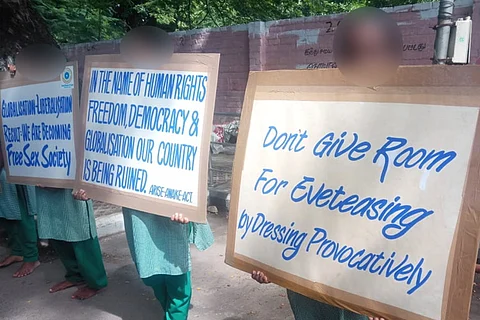

It was a sight that brought 26-year-old Keerthana, who was on her morning walk on Friday, to a complete halt. Standing there, in white and green school uniforms at Karpagam Gardens in Chennai's Adyar, were female school students from Avvai Home Higher Secondary School with extremely offensive, sexist and homophobic posters in their hands.
'Parents protect yourself & your children from Gays-Homos-Lesbians', 'Do not corrupt other minds by wearing provocative & revealing dresses', 'Women using dupatta meant for its purpose walk without any fear', 'Sexy dresses invites eve-teasing', 'Women's groups express support for bar girls. What a shame?!'
These were the lines splashed across the blue and white charts that were held up by the unassuming students who were chatting and laughing on the public road.
"There were at least 50 female students, accompanied by 6-7 members of the school staff," said Keerthana, who works in a self-financed college. "I immediately confronted the adults there and demanded to know what a 'sexy dress' was. A man, who was standing with them, said that it was when a woman showed her breasts in public. I was just horrified. How can they teach young girls that rape or sexual harassment is their fault?" she asked.
The man whom Keerthana confronted is R Mohan, a former employee of the State Bank of India, who along with serving and retired staff has been conducting these 'awareness' programmes for 17 years in Chennai. He is not associated with the school in any official capacity.
When TNM contacted the school, the assistant headmaster, who refused to divulge her name, claimed that she had not seen the posters before sending her students to hold them up in a public place.
"Our staff went with the girls for their safety but we had not seen what the posters said. The (ex) SBI staff R Mohan told us that it was regarding women's safety," she said. However, when probed about the content, she says that she agrees with it. Further, the senior teacher, who is in a position to influence young minds, says that limiting the freedom of girls and women as opposed to educating boys and men was the means to stop sexual harassment.
"We (women) have to concentrate on our dresses," she added, when asked about the messages on women's attire.
But doesn't that amount to blaming the victim for sexual harassment? Shouldn't men be the ones receiving moral education?
"We (women) have to take the message positively. We have to take steps for safety when incidents like this happen. Gents are filled with lust," she argued, falling back on patriarchal ideas that have contributed towards building a culture where the onus of preventing sexual violence has been placed exclusively on women.
Mohan, who organised the campaign, says that these posters have been held up across the city for the past 17 years. When TNM pointed out that his posters are homophobic and sexist, he countered this with more misogynistic statements.
"No, it doesn't place the blame on women," he said, before resorting to the 'biology' argument. "Biological urge for men and women are same. If a person wears clothes exposing their breasts or if it is transparent, this naturally.... It is a spur of moment action (sexual harassment or rape). The person is just..he searches for opportunity. And if he gets the opportunity, he does it," he said.
To make matters worse, he claimed that women do not have the right to wear the clothing of their choice.
"It is done by a handful of Westernised people who think they have the right to expose their body in public places and to kiss in public places. This is not Tamil culture," said Mohan. "This will definitely lead to sexual harassment. The biological urge is spur of the moment. Not just young boys, even old people are not exceptions," he added, reducing men to mere animals with 'urges'.
When asked about the homophobic content on his posters, he said, "Children should be taught about gays and lesbians and warned about unwanted advances," he said.
When TNM contacted M.P. Nirmala, the Chairperson of Tamil Nadu Commission for Protection of Child Rights (TNCPCR), she said that the school in the past has been averse to progressive awareness programmes.
"Yes, children cannot be made to hold such posters and probably don't even know the contents," she said. "But we can only take action if there is a complaint."